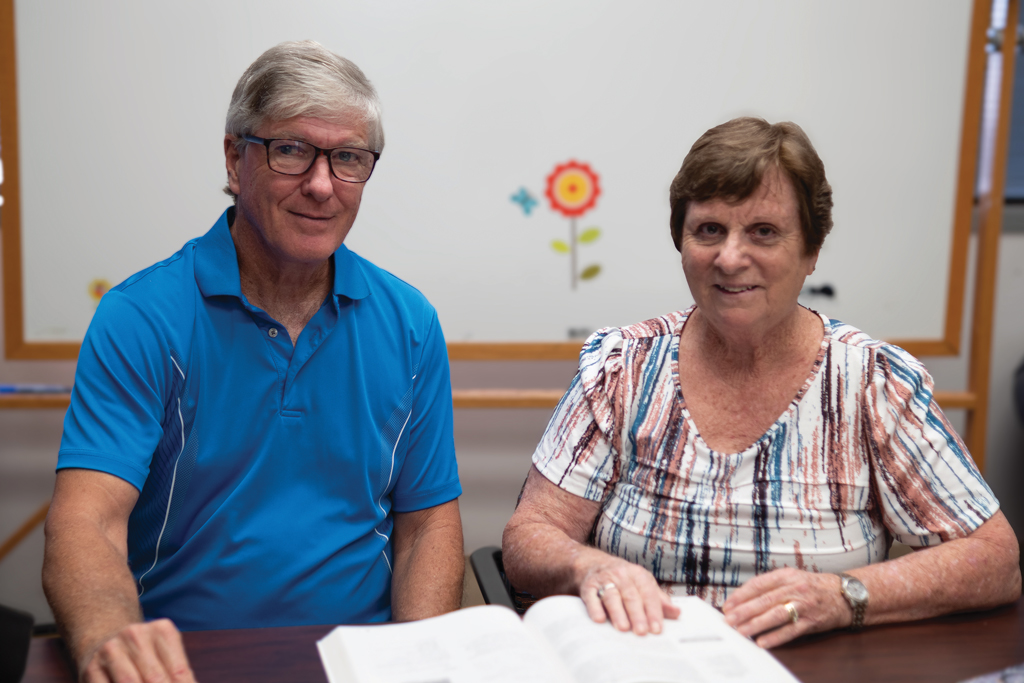Literacy Highland Lakes needs volunteers

Literacy Highland Lakes volunteers Laren Childers (left) and Sue Wieland help adults studying for GED and citizenship exams or learning to read. Volunteers meet with students on Thursday evenings at the Kingsland Branch Library and Monday afternoons at the Burnet school district’s Parent Resource Center. Staff photo by David Bean
Literacy Highland Lakes addresses a big need in the area, but it also has a big need: volunteers to help adult students study for high school equivalency degrees and citizenship tests or learn to read.
The 38-year-old nonprofit is seeking tutors in Burnet and Llano counties for either one-on-one help or two of the free, two-hour study sessions held each week.
Classes are from 1-3 p.m. Mondays at the Burnet school district’s Parent Resource Center, 202 E. Briar St. in Burnet, or 6-8 p.m. Thursdays at the Kingsland Branch Library, 125 W. Polk St.
“It’s a very rewarding job,” said Nancy Richardson of Burnet, a longtime volunteer and vice president of the Literacy Highland Lakes Board of Directors. “You don’t have to be a teacher to volunteer. And you don’t have to sign up long term or promise to come weekly. You can help when you are able.”
According to U.S. Census Bureau figures from July 1, 2024, 10.8 percent of Burnet County residents ages 25 and older did not have a high school diploma or equivalency. In a population of 55,722 (from 2024), that equaled about 6,017 people.
For Llano County’s population of 23,163 (also 2024 figures), around 1,876 people, or 8.1 percent, did not have a high school diploma or equivalency.
“The need is great,” said Literacy Highland Lakes board President Sue Wieland of Kingsland. “There are more people we are not reaching than we are reaching who need it.”
Before the COVID-19 lockdowns in 2020 and 2021, Literacy Highland Lakes had around 80 volunteers who worked with 20 or more students at each weekly session. Now, volunteers number around 15, and most of them are on the Board of Directors.
At least two volunteers are needed for each of the two-hour weekly classes. Literacy Highland Lakes provides the four-subject GED books free to students, assists with tutoring and advice on an as-needed basis, and gives practice tests.
“We work to build (the students) up as they go along,” Richardson said. “We give them practice tests, and when they score high enough, we set up the real test. We start with the easy subjects and end with math.”
The biggest need is for math tutors and bilingual volunteers. GED tests, which are administered in Cedar Park, Round Rock, and Killeen, are done one subject at a time and cost $36.75 each. Literacy Highland Lakes pays for the first two tests. Tests three and four are also available for free if students show a need.
Citizenship tests are much more expensive, over $400, and intensive. They are given in San Antonio and must be done orally in English. Volunteers help students study 100 questions to prepare. It takes months for a student to be ready for the exam.
“You have to know the answers to all 100 questions, but you will only be asked two or three of them and you don’t know which ones will be asked,” Richardson said. “You have to know it. I think I would fail the test. I wouldn’t get my citizenship.”
The group also teaches reading skills.
“One man who came in for his GED couldn’t read,” Richardson said. “He could do math in his head faster than a calculator, but he couldn’t read.”
A former first-grade teacher, Richardson started at the beginning with her new GED applicant.
“It was so neat to see the light coming on as he learned,” she said. “He got his GED and that makes you feel good, too. You know you are doing something good. If I hadn’t gotten anyone but him as a student, it would have been worth it.”
Adult volunteers from all walks of life and age groups are welcome. Each must pass a background check before they can get started. Although both Richardson and Wieland are retired teachers, experience in educational instruction is not necessary or required.
“One of our math tutors was an engineer,” Richardson said. “We need you so bad, and it is so rewarding.”
Richardson and Wieland have been instructors in the program for about 20 years each. They have stuck around for a reason.
“You get a reward, too,” Richardson said. “You get the satisfication of helping that student better their life by getting a better-paying job. Having a GED opens up so many more jobs. Come to class and we’ll show you what to do.”
Wieland agreed.
“As a parent, when you see your child having success with some step in their development, this is the same idea,” she said. “I just like to see people succeed and feel good about themselves, for them to feel worthwhile.”
Anyone wanting to volunteer can show up at a class and start on-the-job training right away.
“These students need tutors,” Richardson said. “Each student is working on a separate subject at their own speed. Volunteers go around and help anyone struggling.”
Students can also show up and ask to be a part of a program that measures success with a diploma and improved job opportunities.
“Everybody that finalizes their GED is a success story in itself,” Wieland said. “They all go different ways. They all do something different with what they’ve earned. They are all successes.”
For more information on volunteering or becoming a student, visit literacyhl.org or email literacyhl@gmail.com.

